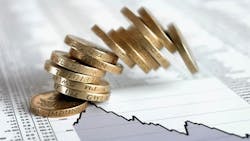LONDON -- Britain's economy shrank 0.3% in the final quarter of 2012 and recorded zero growth for the year as a whole, official data revealed on Friday, placing the country on the brink of a "triple dip" recession.
British finance minister George Osborne said he was "determined to confront" the economic problems facing the country, which he claimed had been hit hard by the high debt inherited by the government and owing to eurozone strains.
"After growth of 0.9% in third quarter, the economy contracted by 0.3% in the fourth quarter of 2012," the Office for National Statistics said in a statement, adding that gross domestic product growth was flat over the year.
"GDP is estimated to have been flat between 2011 and 2012," the ONS said.
Should Britain's economy shrink also in the current first quarter, then the country will enter its third recession since the 2008 global financial crisis.
"Given that a technical recession requires two consecutive quarters of falling output, this is arguably not a true 'triple-dip' yet," noted Vicky Redwood, chief UK economist at the Capital Economics research group.
"But there are no hard and fast definitions, and another contraction in Q1 is quite possible anyway, especially given the snow disruption."
Britain was hammered in particular by a 1.8% contraction in its production and manufacturing sector.
Chancellor of the Exchequer Osborne said the latest data was "a reminder today that Britain faces a very difficult economic situation."
He added: "A reminder that last year was particularly difficult, that we face problems at home because of the debts built up over many years and problems abroad with the eurozone, where we export most of our products, in recession.
"Now, we can either run away from those problems or we can confront them and I am determined to confront them so that we can go on creating jobs for the people of this country," Osborne said in a statement.
Britain is not a member of the eurozone but has been affected by the neighboring bloc's ongoing financial crisis.
Activity has been hit hard also by deficit-slashing austerity measures from the nation's Conservative-Liberal Democrat coalition government.
Tough Times for British Retailers
In recent weeks, major British retailers have either been forced to close completely or seek outside help to remain operational. DVD rental chain Blockbuster UK and music retailer HMV became the latest casualties last week, entering administration in a bid to stay alive.
Camera chain Jessops shut in early January after electrical firm Comet closed its 235 stores just before Christmas.
The IMF's chief economist, Olivier Blanchard, had urged Britain on Thursday to lessen the pace of its austerity program because of the risk that it could fall back into recession this year.
Blanchard said Britain's annual budget statement due in March would be a good time for finance minister George Osborne to "take stock" of his program of deep spending cuts and tax hikes.
As Britain suffers, Europe's top economy Germany appears to have put the worst of the region's debt crisis behind it, separate data showed on Friday, with business confidence rising to its highest level in seven months.
The German data, coupled with the Britain's GDP figures, pushed sterling to a 13-month low point against the European single currency in Friday trading.
"The silver lining for the UK's production industries could be the weak pound, which nose-dived after the GDP release, which may benefit UK exports in the coming months," said analyst Kathleen Brooks at trading group Forex.com.
Britain's economy contracted in the fourth quarter after expanding by 0.9% in the third quarter of last year, when the country also exited a double-dip recession.
However the third-quarter growth was boosted by one-off factors, including the London 2012 Olympic Games and rebounding activity after an extra public holiday for Queen Elizabeth II's Diamond Jubilee.
Britain sank into the first phase of a double-dip recession in 2008 amid the devastating global financial crisis that sparked a number of vast banking bailouts.
The economy rebounded in late 2009, but struggled before falling into a second downturn in late 2011, which lasted for three quarters as the eurozone crisis loomed large.
- Ben Perry, AFP
Copyright Agence France-Presse, 2013
About the Author
Agence France-Presse
Copyright Agence France-Presse, 2002-2025. AFP text, photos, graphics and logos shall not be reproduced, published, broadcast, rewritten for broadcast or publication or redistributed directly or indirectly in any medium. AFP shall not be held liable for any delays, inaccuracies, errors or omissions in any AFP content, or for any actions taken in consequence.
